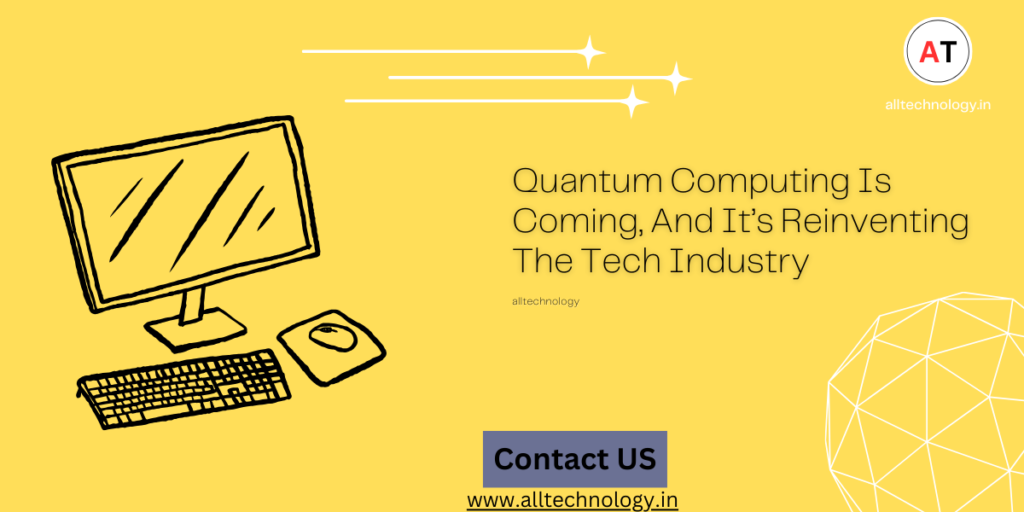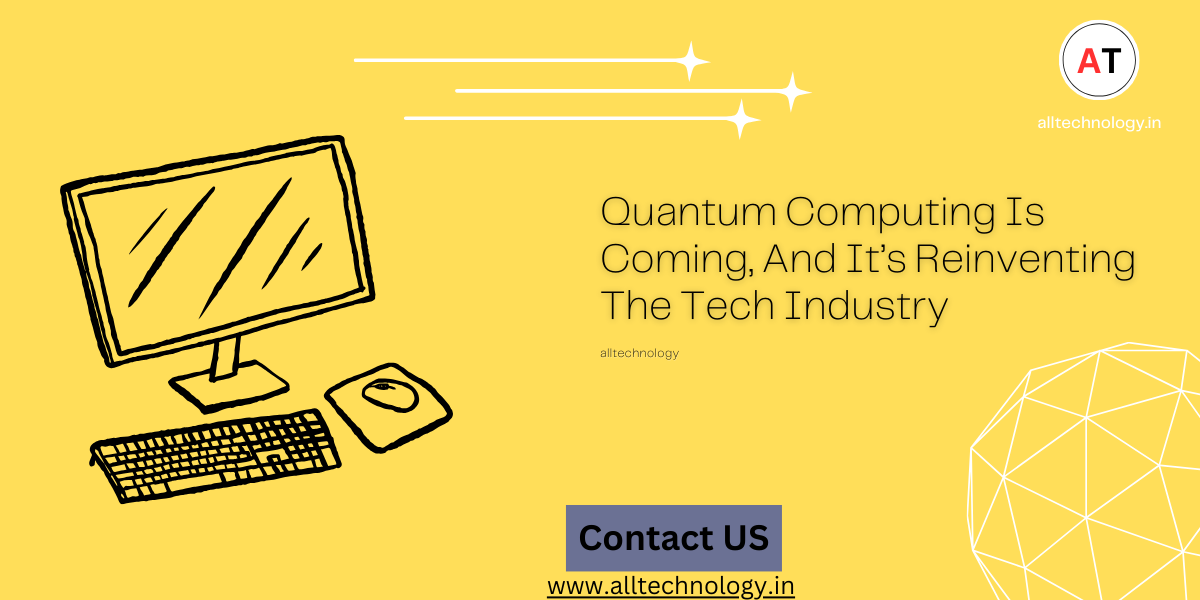Introduction
Hello Bloggers welcome alltechnology blog. In this blog you will learn Quantum Computing Is Coming, And It’s Reinventing The Tech Industry. So friends, I have given a lot of information in this blog post, if you liked my information then please let me know.

This technology can produce computers that calculate at incredibly high speeds compared to typical machines.
Further developments have increased the bit count and reduced the rate of errors. Researchers believe that problems currently too large to be solved by traditional computers can be solved using quantum computers.
Recent developments Given the substantial improvements that quantum computing can provide to computing power, research into quantum computers has been going on for decades. However, important breakthroughs have been seen in recent years.
Last week, Australian engineers announced the discovery of a way to control electrons within quantum dots that run logic gates without the need for a large, bulky system.
This could help with building quantum computers that are reasonably sized. Also, researchers at MIT recently developed an architecture for quantum computers that will allow for high-fidelity communication between quantum processors, allowing for the interconnection of multiple processors.
This allows for “modular implementations of larger-scale machines built from smaller individual components,” according to Bharath Kanna, a co-lead author of the research paper describing this breakthrough.
“The ability to communicate between smaller subsystems will enable a modular architecture for quantum processors, and this may be a simpler way of scaling to larger system sizes compared to the brute-force approach of using a single large and complicated chip.”
Some groups are already participating in “Store Now, Decrypt Later” attacks, which steal encrypted data and store it with the expectation that they’ll be able to crack the encryption at a later date. Quantum computing could also have major effects on the medical industry. For example, quantum machines could be used to model molecular processes. This could assist with breakthroughs in disease research and speed up the development of life-saving drugs.
Its artificial intelligence can help you build a portfolio for any purpose that will succeed in any economy. With Investment Kits, Q.ai makes investing fun.
Computing’s top tech predictions for 2024
CIOs and other innovators are already building and using advanced technology in and outside the workplace, so what can we expect 2023 to look like from an IT perspective?
It has, for several years, been an employees’ market, and while spiralling salary demands aren’t sustainable in the long term, there are few signs of supply easing in the near future. In fact, the labour pool is practically tapped out at this point. The move to remote working meant businesses could take on people from new locations and situations, like stay-at-home parents; but most of those with interest have been recruited in the last two years.
Prashanth Chandrasekar, CEO of Stack Overflow, said that rather than remaining stagnant – a problem in itself – the pool of available employees might actually be shrinking: “The labour pool may actually be contracting due to…increasing insularity and anti-immigrant fervour around the world.
In the US, for example, the number of immigrants holding a US H-1B visa and high-tech job fell 9% in 2021 from 2020, the highest drop in a decade. In 2022, with layoffs hitting H-1B holders who will now be forced to return home, the drop may even steeper.
” The UK has already experienced this in the aftermath of the Brexit vote, and so far the Government seems to have little idea how to remedy the situation.
The invisible ambient technology evolution powered by AI
This may sound surprising, but the next evolution of technology is likely to happen largely unnoticed. No ground-breaking product or device, just seamless digital experiences that happen automatically based on a person’s particular preferences, needs or the environments they are in. This is being fuelled by a changing compute landscape, with the exponential growth of AI-based technologies and experiences.
This technology evolution is known as “ambient intelligence,” when there is no need for people to consciously interact with the technologies they use every day. The billions of different devices worldwide still have a role, but fade effortlessly into the background – almost invisibly – only coming to the fore when necessary.
Andy Rose, VP of Technology Strategy at the leading technology organisation Arm, says, “Ambient experiences mean more technologies becoming invisibly part of our lives. This requires more computing power, more advanced AI and even greater security as personal data informs everyone’s own ambient experience.”
Ambient experiences are highly personalised and attuned to the needs, preferences and environments of people. The acceleration of AI-based technologies brings together a multitude of services and intelligence. They collate and interpret the data and then automatically implement the most relevant experience based on the person and the environment they are in.
Sensors and smartphones are critical technologies for ambient computing, now and in the future. “They will provide the contextual awareness that is needed to facilitate ambient experiences, gathering information about various public or private environments and then making this information relevant to people based on their own unique preferences,” says Rose.
Today’s AI-powered digital assistants on smartphones respond to a person’s request to perform an action, like ”turn on the lights.” But in future ambient experiences, digital assistants will understand a person’s location and perform an action automatically, like adjusting temperature or lighting settings when a person walks into their home.
In the home, devices will automatically connect to improve or adjust the environment, for example, air purifiers will recognise high pollen days and automatically adjust the fan settings, while autonomously activating the robot vacuum to clean the house more.
Offices will automatically book desks and rooms for workers as soon as they walk into the building. Hospitals with many sensors installed in the building will detect physical or physiological movement, such as breathing, heart rates and even falls, among patients so healthcare issues are identified early. Voice-enabled AI will then automatically document conversations between physicians and patients, rather than relying on paperwork from memory.
Connected infrastructure in urban environments adapt to real-time conditions and provide relevant, timely information to the public. Public transportation is a good example, with sensors in trains detecting whether certain carriages are busy or not, and then communicating this information to passengers. This could evolve to real-time instructions on the smartphone that guide passengers to the right seat for them based on their travelling preferences and location.
Beyond the evolution of current technology experiences, ambient computing will provide brand new experiences that will essentially give people a “digital sixth sense.” These involve the amplification of senses where people will see, hear and even smell or touch at levels never seen before. This has life-changing implications for those suffering from sight or hearing disabilities.
Updated hearing aids or new ‘hearables’ could also provide advanced hearing capabilities. When connected with ambient compute systems, these devices could bring sounds to the fore that are relevant to users and their environments. For example, the sound of a car when a person approaches a blind corner.
However, as with any evolution of technology, ambient computing will deliver complex challenges that the tech industry must solve.
“Sensors, smartphones and other supporting devices will need more compute power and processing, like advanced AI capabilities,” Rose shares, “but with power efficiency built-in so this compute takes place at the ‘edge’ – on the actual devices rather than in the cloud – for quicker, more secure ambient experiences.”
Software also has an important role to play. “Sensors in ambient compute systems not only require reliable, secure hardware capable of managing large amounts of data, but also fluid software so developers can keep adding more features,” he says.
Due to the collection of valuable personal data to create these highly personalised ambient computing environments, privacy and security will be paramount. “Many enhanced security technologies are already available today, but there will need to be additional measures and protections to appropriately handle sensitive information,” says Rose.
The vast array of technologies that will be used across ambient computing – from low-power sensors to smartphones to big data centres – needs to be matched by a common, pervasive computing platform.
With the largest computing footprint on the planet, Arm (NASDAQ: ARM) offers the perfect foundation to power the next evolution of technology that is seamless, highly personalised ambient experiences.
Conclusion
So friends I have given you a lot of information in this post of mine such as, Computing’s top tech predictions for 2024,The invisible ambient technology evolution powered by AI etc.
